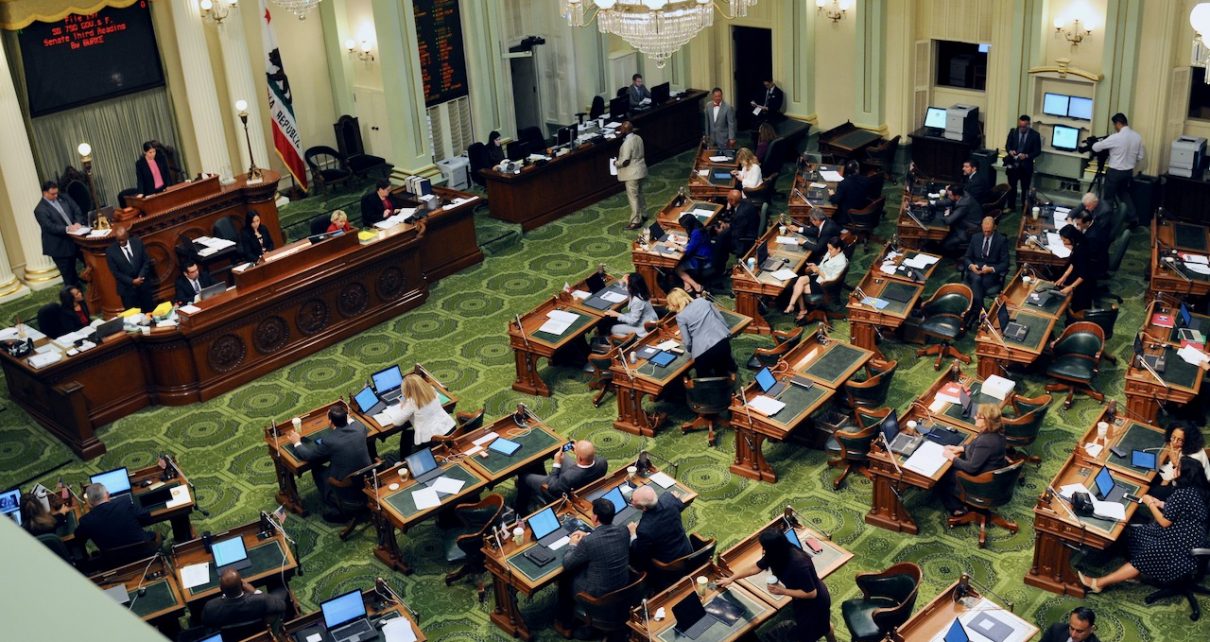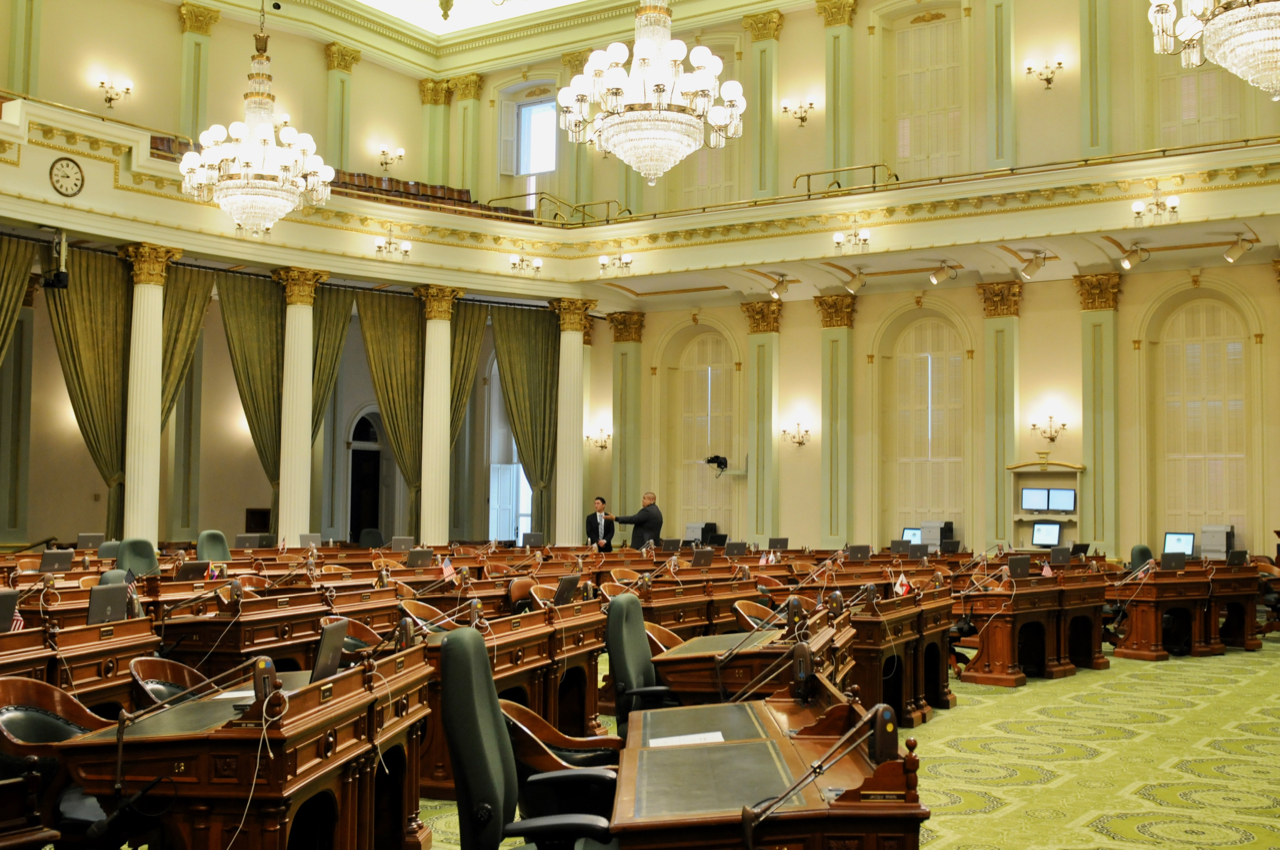
California State Assembly Chamber. (Photo: Kevin Sanders for California Globe)
AB 1 – Details of the Legislative Staff Unionization Legislation
‘Employee of the Legislature’ would not include legislators or appointed officers
By Chris Micheli, December 9, 2022 9:37 am
On December 5, 2022, Assembly Bill 1 was introduced by Assembly Members Tina McKinnor, Isaac Bryan, Matt Haney, Ash Kalra, Alex Lee, Kevin McCarty, and Eloise Reyes. It is also co-authored by 13 other Assembly Members and 7 Senators. AB 1 would add Chapter 12.5 (commencing with Section 3599.50) to Division 4 of Title 1 of the Government Code.
Section 1 of the bill would add Chapter 12.5, which would be titled “Legislature Employer-Employee Relations.” Government Code Section 3599.50 would provide the title of the chapter to be the Legislature Employer-Employee Relations Act.
Government Code Section 3599.51 would provide legislative findings and declarations that it is the purpose of Chapter 12.5 to promote full communication between the Legislature and its employees by providing a reasonable method of resolving disputes regarding wages, hours, and other terms and conditions of employment between the Legislature and public employee organizations.
In addition, it is the purpose of Chapter 12.5 to promote the improvement of personnel management and employer-employee relations within the Legislature by providing a uniform basis for recognizing the right of employees of the Legislature to join organizations of their own choosing and be represented by those organizations in their employment relations with the Legislature.
Section 3599.52 would define the terms “Board,” “employee of the Legislature,” “confidential employees,” “employee organization,” “Legislature,” “maintenance of membership,” “mediation,” and “recognized employee organization.”
Note that “employee of the Legislature” would not include legislators, appointed officers (e.g., Assembly Chief Clerk and Sgt. at Arms, Senate Secretary and Sgt. at Arms), and office leaders (e.g., chief of staff, staff director, or chief consultant).
Section 3599.54 would provide that any person who willfully resists, prevents, impedes, or interferes with any member of the board, or any of its agents, in the performance of duties pursuant to this chapter, is guilty of a misdemeanor, and, upon conviction thereof, would be sentenced to pay a fine of not more than $1,000.
Section 3599.55 would provide that the initial determination as to whether charges of unfair practices are justified, and, if so, what remedy is necessary to effectuate the purposes of this chapter, is a matter within the exclusive jurisdiction of the board, with specified exceptions. In addition, any employee or employee organization, or the Legislature, has the right to file an unfair practice charge, except that the board cannot issue a complaint for a charge than occurred more six months prior to filing, or issue a complaint until the grievance process in any agreement has been exhausted.
Section 3599.56 would provide that employees of the Legislature have the right to form, join, and participate in the activities of employee organizations of their own choosing for the purpose of representation on all matters of employer-employee relations. Employees of the Legislature also have the right to refuse to join or participate in the activities of employee organizations, with specified exceptions.
Section 3599.57 would provide that employee organizations have the right to represent their members in their employment relations with the Legislature, and that once recognized, that organization may establish reasonable restrictions regarding who may join and may make reasonable provisions for the dismissal of individuals from membership.
Section 3599.58 would provide that all employee organizations have the right to have membership dues, initiation fees, membership benefit programs, and general assessments deducted until an employee organization is recognized as the exclusive representative for employees in an appropriate unit, and then any deductions as to any employee in the negotiating unit are not permissible except to the exclusive representative.
Section 3599.59 would provide that, once an employee organization is recognized as the exclusive representative of an appropriate unit, it may enter into an agreement with the Legislature providing for organizational security in the form of a maintenance of membership deduction. The Legislature would have to furnish the recognized employee organization with sufficient employment data.
Section 3599.60 would specify that the scope of representation is limited to wages, hours, and other terms and conditions of employment, except that the scope of representation does not include consideration of the merits, necessity, or organization of any service or activity provided by law.
Section 3599.61 would provide that, except in cases of emergency, the Legislature is to give reasonable written notice to each recognized employee organization affected by any law, rule, or resolution directly relating to matters within the scope of representation proposed to be adopted by the Legislature, and give the recognized employee organizations the opportunity to meet and confer with the Legislature.
Section 3599.62 would require the Legislature to meet and confer in good faith regarding wages, hours, and other terms and conditions of employment with representatives of recognized employee organizations, and consider fully the presentations as are made by the employee organization on behalf of its members prior to arriving at a determination of policy or course of action. The term “meet and confer in good faith” is defined.
In addition, the Legislature would be required to freely provide to representatives of recognized employee organizations nonconfidential information that is necessary and relevant to their scope of representation.
Section 3599.63 would provide that, if an agreement is reached between the Legislature and the recognized employee organization, the parties would jointly prepare a written memorandum of understanding reflecting the terms of the agreement, which shall be presented, when appropriate, to the Legislature for adoption as a resolution.
Section 3599.64 would provide that a side letter, appendix, or other addendum to a properly ratified memorandum of understanding would be expressly identified by the parties if that side letter, appendix, or other addendum is to be incorporated in a subsequent memorandum of understanding submitted to the Legislature for adoption as a resolution.
Section 3599.65 would provide that, if the Legislature does not fully fund any provision of the memorandum of understanding that requires the expenditure of funds, either party may reopen negotiations on all or part of the memorandum of understanding.
Section 3599.66 would provide that, if a memorandum of understanding has expired, and the Legislature and the recognized employee organization have not agreed to a new memorandum of understanding and have not reached an impasse in negotiations, the parties to the agreement would continue to give effect to the provisions of the expired memorandum of understanding.
Section 3599.67 would provide that, if, after a reasonable period of time, the Legislature and the recognized employee organization fail to reach an agreement, the Legislature and the recognized employee organization may agree upon the appointment of a mediator mutually agreeable to the parties, or either party may request the board to appoint a mediator.
Section 3599.68 would require a reasonable number of employee representatives of recognized employee organizations to be granted reasonable time off without loss of compensation or other benefits when formally meeting and conferring with the Legislature on matters within the scope of representation.
Section 3599.69 would make it unlawful for the Legislature to do any of the following:
- Impose or threaten to impose reprisals on employees, discriminate or threaten to discriminate against employees, or otherwise interfere with, restrain, or coerce employees because of their exercise of rights guaranteed by this chapter.
- Deny to employee organizations rights guaranteed to them by this chapter.
- Refuse or fail to meet and confer in good faith with a recognized employee organization.
- Dominate or interfere with the formation or administration of any employee organization, or contribute financial or other support to it, or in any way encourage employees to join any organization in preference to another.
- Refuse to participate in good faith in the mediation procedure.
Section 3599.70 would make it unlawful for an employee organization to do any of the following:
- Cause or attempt to cause the Legislature to violate Section 3599.69.
- Impose or threaten to impose reprisals on employees, discriminate or threaten to discriminate against employees, or otherwise interfere with, restrain, or coerce employees because of their exercise of rights guaranteed by this chapter.
- Refuse or fail to meet and confer in good faith with the Legislature in relation to the employees for whom it is the recognized employee organization.
- Refuse to participate in good faith in the mediation procedure.
Section 3599.71 would provide specified circumstances where judicial review of a unit determination is allowed.
Section 3599.72 would require the Legislature to grant exclusive recognition to employee organizations designated or selected pursuant to rules established by the board for employees of the Legislature or an appropriate unit thereof, subject to the right of an employee to self-represent.
Section 3599.73 would require the Legislature to adopt reasonable rules for registering employee organizations, determining the status of organizations as employee organizations, and identifying the officers and representatives who officially represent employee organizations.
Section 3599.74 would provide that, if a decision by an administrative law judge regarding the recognition or certification of an employee organization is appealed, the decision is the final order of the board if the board does not issue a ruling that supersedes the decision on or before 180 days after the appeal is filed.
Section 3599.75 would provide that, in determining an appropriate unit, the board is governed by specified criteria and the board is required to not direct an election in a unit unless one or more of the employee organizations involved in the proceeding seeks or agrees to an election in the unit. In addition, when determining an appropriate unit, the board is required to take into consideration specified criteria.
Section 3599.76 would require all initial meet and confer proposals of recognized employee organizations to be presented to the Legislature at a public meeting, and those proposals thereafter are a public record.
Section 3599.77 would provide that a Labor Code statement of policy would not apply to employees of the Legislature.
Section 3599.78 would provide that this chapter does not modify or eliminate any existing wages, hours, or terms and conditions of employment for employees of the Legislature.
Section 3599.79 provides a severability clause.
Section 3599.80 would provide that expenses incurred by the Legislature in relation to a properly ratified memorandum of understanding pursuant to this chapter are subject to the constitutional spending limitation per legislator.
Section 3599.81 would provide that Chapter 12.5 would become operative on July 1, 2024.
Section 2 of the bill contains a reimbursement disclaimer.
- Renewal of Judgments - February 18, 2026
- Hearings on Third-party Claims - February 18, 2026
- Cullen Earthquake Act - February 17, 2026





Assembly Bill 1 that would unionize legislative staff was introduced by Assembly Members Tina McKinnor, Isaac Bryan, Matt Haney, Ash Kalra, Alex Lee, Kevin McCarty, and Eloise Reyes. It is also co-authored by 13 other Assembly Members and 7 Senators? No doubt they’re all Democrats who want another voting block? How does this legislation benefit taxpayers and the citizens of California?
Do not ever embed staff members with any guaranteed job protections when they are employed by term-limited elected officials. They come and go with the party that hires them. Nothing more.
Biggest flaw in term-limits it the constant turnover of new faces ,who in turn hire staff who never need to be responsive to the electorate, but hold the hands far too tightly of the newly elected known nothings.
That is how the deep state – the unelected administrative branch of our government – has now taken over our lives and our liberties already. Do not grant them any other perk of embedded power. They are hired only as long as the one term-limited employer chooses to employ them – and not second longer.
Another reason the leave. The state gov is being run by UNELECTED people and now they will have a safe guarded position. This state is so far gone it may never be turned around.